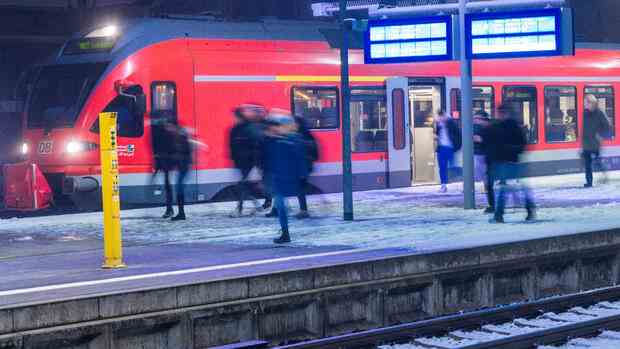The planned 49-euro ticket turns out to be more complicated than expected.
(Photo: dpa)
Berlin The planned 49-euro ticket is likely to miss the goal of Federal Transport Minister Volker Wissing (FDP) to eliminate the tariff jungle in local public transport (ÖPNV). As the Handelsblatt learned from industry circles, there are no plans to reduce the number of tariffs.
According to the information, the ticket, which is valid nationwide in local and regional transport, will also be associated with various restrictions. Subscribers should be able to cancel monthly, but this should result in “a service fee of 30 euros in the first few months”.
The ticket should only be used by one person. It is also not intended for users to take a bicycle or a dog with them without additional costs. Tickets for students, pensioners and other discounts should be retained.
The additional ticket will be available on paper as well as digitally. It should be a “supplementary tariff”, as the industry said in relation to the preliminary work of the Association of German Transport Companies (VDV). Insiders spoke of a “dam breach in the tariff structure” if it came to a simple system.
Top jobs of the day
Find the best jobs now and
be notified by email.
On Thursday, Chancellor Olaf Scholz (SPD) and the prime ministers of the federal states agreed to introduce the ticket in the new year and to bear all the costs – even if the three billion euros promised so far should not be enough – and thus gave up the pressure from the German City Days and also the VDV.
Ticket could cost taxpayers 4.7 billion euros a year
Before the meeting, in a letter to the chancellor and prime minister, they had pushed for the agreed commitment and called for a “top billing by the industry”. Their argument: the demand for the ticket cannot be reliably predicted. However, since the transport companies expect costs of 4.7 billion euros, they were only willing to prepare and introduce the ticket if they accepted.
The states insist that the ticket is a federal project and that it has to bear all other costs accordingly.
(Photo: IMAGO/Chris Emil Janssen)
It is likely that not only the subsidies, but also the ticket prices will rise quickly. This is supported by the fact that politicians and companies only talk about the Germany ticket and see the 49 euros as an “introductory price”. The term is even used in the federal-state decision.
- “This means that the traffic light government’s wishful thinking of creating a uniform, nationwide, affordable public transport ticket is a long way off. That is the opposite of progressiveness,” criticized Ulrich Lange, deputy leader of the CDU/CSU parliamentary group.
- The President of the Federal Association of Local Rail Transport, Thomas Prechtl, explained: “With the commitment of the federal and state governments to each bear half of any additional costs in the year of introduction of the Deutschlandticket, the way is now finally clear to enable people to enjoy nationwide and environmentally friendly mobility in public transport. “
- VDV General Manager Oliver Wolff said: “Now the industry has the necessary financial security to implement the Deutschlandticket as quickly as possible.”
The Deutschlandticket is intended to replace the nine-euro ticket, which was valid for three months in the summer and cost the federal government 2.5 billion euros.
With the new ticket, however, there are still many problems that need to be solved. In the new year, the Bundestag will have to amend the regionalization law again, through which the federal government finances local transport in the federal states. The cabinet is due to adopt a draft in January, and the Bundestag and the Bundesrat are due to decide in March. Should bus companies such as Flixbus also be allowed to offer the ticket, then the Passenger Transport Act would also have to be reformed, as it was said.
The EU Commission must approve the plans
On top of that, the EU Commission must approve such a permanently subsidized ticket, since a number of private transport providers could lose business. The commission has already sent a list of questions to the ministry, which has yet to reply. “The vote is still ongoing,” the ministry said.
Districts, municipalities and cities would ultimately have to include the tariff proposed by the federal government in their tariff systems. Above all, however, the industry must then develop a system through which the income from ticket sales can be distributed nationwide.
For example, the ticket would also be valid in tourist strongholds, which would cause the companies’ income there to collapse massively. However, it must be determined who, for example, uses the local Baederbahn or the Harzer Brockenbahn with a 49-euro ticket in Usedom. “There are still many, many unanswered questions,” said the industry on Friday.
In addition to the current questions, it is still unclear how things will continue beyond 2023. “In the following years, the federal and state governments will jointly agree on how the financing will be secured through ticket income and the agreed grants of 1.5 billion euros each,” says the federal-state decision.
The states insist that the ticket is a federal project and that it has to bear all other costs accordingly. This time the compromise was easy: Since the ticket will not be introduced until spring, the three billion euros will probably be enough.
More: 49-euro ticket – Federal Audit Office warns of an expensive deal
